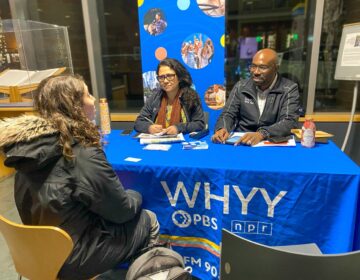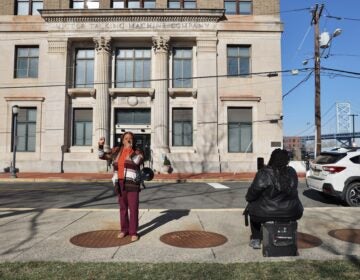Camden’s Columbus statue departs, but his isn’t the only name activists want gone
Saturday’s “Black Men Rising” march put a period on the statue’s removal. But other famous local personages stand as ongoing symbols of racism, many say.

Pastor Levi Combs III of Camden's First Refuge Baptist Church, watches over pieces of the Christopher Columbus statue in Farnham Park on Friday, June 12, 2020. (April Saul for WHYY)
In Camden — a city of communities of color where activists say they’ve been fighting systemic oppression for years — a statue of Christopher Columbus became collateral damage in the struggle.
Rev. Levi Combs III, of First Refuge Progressive Baptist Church, had made an agreement with Camden County Freeholder Louis Cappelli Jr. that the city would remove the statue, erected in Farnham Park in 1915, at the end of Saturday’s “Black Men Rising” march.
Late Thursday afternoon, Combs got a call that the statue was being taken down prematurely, and he rushed to the park.
“I saw them putting the statue on the trailer,” he said. “I got on top of it and said, `This isn’t going anywhere because this isn’t our agreement!’”

Combs and a few dozen activists blocked the city’s truck, decapitated the heavy statue, and posed with the head for social media. Determined to keep the pieces of the Italian explorer there until Saturday, they watched over the fragments in shifts. For two nights, they slept in bags and on blankets. They ate pizza and doughnuts and drank coffee brought over by sympathizers.
In Camden, where police marched alongside peaceful protesters after the killing of George Floyd by officers in Minneapolis, the statue’s dismembering was the lone act of destruction in the last two weeks. Even that, activists said, was avoidable.
“This is about closure,” Combs said. “The residents who fought for this to be gone should witness it being gone.”
By Friday afternoon, Combs said, he’d received an apology call from Cappelli. Camden County issued a statement that Columbus had directed “countless atrocities,” and that other area statues of him would be removed or relocated to private locations. Camden Mayor Frank Moran, who was blamed by activists for countermanding the freeholder’s pledge to wait until Saturday, made a public statement that the statue’s removal was long overdue.
On Saturday, 150 demonstrators, led by Combs, marched to Pomona Hall, the colonial mansion that is the home of the Camden County Historical Society.
The mansion had been the headquarters of a sprawling plantation run by slave owner Marmaduke Cooper in the 1700s. Numerous buildings, roads, organizations and companies in the city and county bear his family’s name, including Cooper River Park and Cooper University Hospital.
“You are standing on sacred ground,” Combs said at Pomona Hall.
Pastor Ojii BaBa Madi, of Asbury United Methodist Church in Woodlynne, told the demonstrators of Cooper’s 14 slaves and the city’s history as a busy slave-trading port.
“We want the Cooper name erased from Camden,” BaBa Madi said. He also deemed the names of Woodrow Wilson and Walt Whitman — who was known to call Black people “baboons” and did not support their right to vote — inappropriate to grace Camden institutions and landmarks.
“Woodrow Wilson re-segregated the U.S. government, praised the Ku Klux Klan as a glorious organization, and told Black people he would support anti-lynching legislation, then turned his back on it … why the hell is Woodrow Wilson’s name on the high school in East Camden? How are we going to send brown and Black kids to a place with a name that disdains them?”
He and other speakers also addressed redevelopment in the service of gentrification, losing public schools in favor of charter ones, and a political machine they said serves white bosses and not Camden residents.
“Today is the day of reckoning,” BaBa Madi said. “We say no to oppression … we say no to racism. We say no to political control of the people and suppressing their voices.”
Even though they view Columbus as a symbol of genocide, protesters said the lessons this week went far beyond their desire to remove a statue they’ve disliked for decades.
“It really has little to do with Christopher Columbus,” Ronsha Dickerson said. “It has more to do with who he was and teaching our children what democracy looks like. The overarching victory is that we got the statue down, but if the city is screaming Black lives matter, you should respect what people have asked you to do.”

Other Camden residents saw the statue controversy as a teachable moment for their children.
When Tawanda Green-Jones rushed out the door Thursday afternoon to block the statue’s removal, her youngest son, 5-year-old Re’Kye, said, “’Mom, are you going to help somebody?’” she said, “and he gave me his Superman cape.”
When she got home the following morning at 5, he accused her of taking down the Statue of Liberty, and she had to correct him.
Her older son Robert Jones, 24, attended the Saturday protest.
“Look how many leaders are out there who aren’t my age,” he said. “They’re doing the right work, but if they don’t pass it on to us, we’re going back where they started.”
As the march passed her Kaighns Avenue home, 95-year old Arburta DeShong, whose mother was the daughter of a slave, walked slowly to her front fence, carrying a sign that read, “No more slave mentality!”

“I’m so happy it’s coming down,” she said of the Columbus statue. “It should have been done years ago … we have enough to remember.”
As the protest wound to a close in Farnham Park, activists addressed the crowd from atop the platform where the statue used to stand. They had originally planned, Combs said, to place the statue’s head on the base to end the event.
“But we forgot to bring it,” he said.

Get daily updates from WHYY News!
WHYY is your source for fact-based, in-depth journalism and information. As a nonprofit organization, we rely on financial support from readers like you. Please give today.






